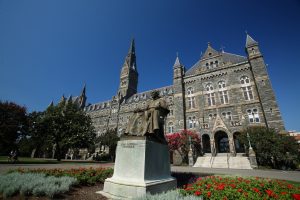Georgetown is distributing $6 million of financial grants from the Coronavirus Response and Relief Supplemental Appropriations Act (CRRSAA) to undergraduate and graduate students. The funding offers aid to eligible students based on expected family contribution (EFC) and comes amidst conversations between GUSA and the administration regarding financial aid.
In the 2020 Coronavirus Aid, Relief, and Economic Security Act (CARES), Congress allocated $14.35 billion for the Higher Education Emergency Relief Fund (HEERF). In HEERF II, signed in December 2020, Congress set aside another $81.88 billion to support colleges and universities. Georgetown received approximately $9 million of emergency funding from the legislation. According to an email from Vice President of Student Affairs Todd Olson, HEERF II requires Georgetown to distribute at least $3,055,322 in emergency financial aid grants to its students. Out of the $9 million provided by the legislation, Georgetown is distributing $6 million of grants to Georgetown students, divided equally between undergraduate and graduate students. Georgetown must follow legislation guidelines while spending the remaining $3 million, but it is not clear how the university plans to use those funds at this time.
Members of GUSA, including GUSA Speaker Melanie Cruz-Morales (COL ’22), President Nico Ferretti (SFS ’21), Nicole Sanchez (SFS ’22), Nile Blass (COL ’22), Eric Perez (COL ‘23), and Sydney Gilbert (SFS ‘23), met with administrators to encourage a timely and equitable distribution of CRRSAA funding.
“Our main purpose was essentially to get this process moving as fast as we could as it’s time-sensitive and also we wanted to ensure these funds would be more accessible to a larger group of students this time around,” Cruz-Morales said in an interview with the Voice. “We are a year into this pandemic and a lot of economic situations have changed for families.”
Last year, undergraduate students with expected family contributions below $15,000 received grants of $2,600, with an additional $300,000 distributed to graduate students. According to Cruz-Morales, approximately 900 Georgetown undergraduate students received emergency financial relief from the university. This year’s grants will be slightly smaller ranging between $1,600 and $2,000 but will be offered to approximately 1,500 undergraduates and 4,000 Georgetown students in total.
GUSA representatives met twice with administration members including Olson, Senior Vice President and Chief Operating Officer Geoffrey Chatas, and Chief Financial Officer David Green to make sure funds were distributed quickly. GUSA members offered a list of demands to the administration, including an amount range from $1,600 to $2,000 based on student EFC, an expansion of students eligible for checks, no required application to receive a check, and grants for financially eligible undocumented and international students.
Cruz-Morales noted that the students involved in these conversations with the administration regarding fund distribution represented the interests of students across financial backgrounds. “It was very important that we had first-generation and low-income students at the table, making these decisions, and I think that was very important to the outcome we were able to get,” she said.
Student demands were met by the administration, and in an email to the student body on Feb. 19, Olson announced emails would be sent to eligible students throughout the day alerting them of their grant. Students who qualify for grants but are ineligible for CRRSAA aid from the federal government, including international and undocumented students, are receiving checks funded by the university.
“It was crucial that we ensured that Georgetown would also find ways to give undocumented and international students checks,” Cruz-Morales said.
The university is also distributing $3 million to graduate students based on financial aid, an increase from the $300,000 in grants offered to them in 2020. These grants come as some graduate students, such as those in the student coalition Tuition Equality Now (TEN), are protesting the 5 percent tuition cut for graduates compared to the 10 percent tuition deduction for undergraduates. TEN calls for a 10 percent decrease in tuition, citing extra financial burdens of graduate students, including rent, student loans, and costs of supporting a family.
Cruz-Morales expressed GUSA’s satisfaction that distributed funding is divided evenly between undergraduate and graduate students. “We specifically outlined that we wanted to see $3 million go to undergraduate students and $3 million go to graduate students,” she said. “That was an important thing for us to advocate and include just because we are all going through a hard time and we didn’t want to leave graduate students behind.”
Cruz-Morales noted that the impact of additional funds cannot be understated. “These funds will drastically improve or help students’ lives in this current movement,” she said. “It was an exciting day just to see how student organizing can actually lead to implementing real influence.”




